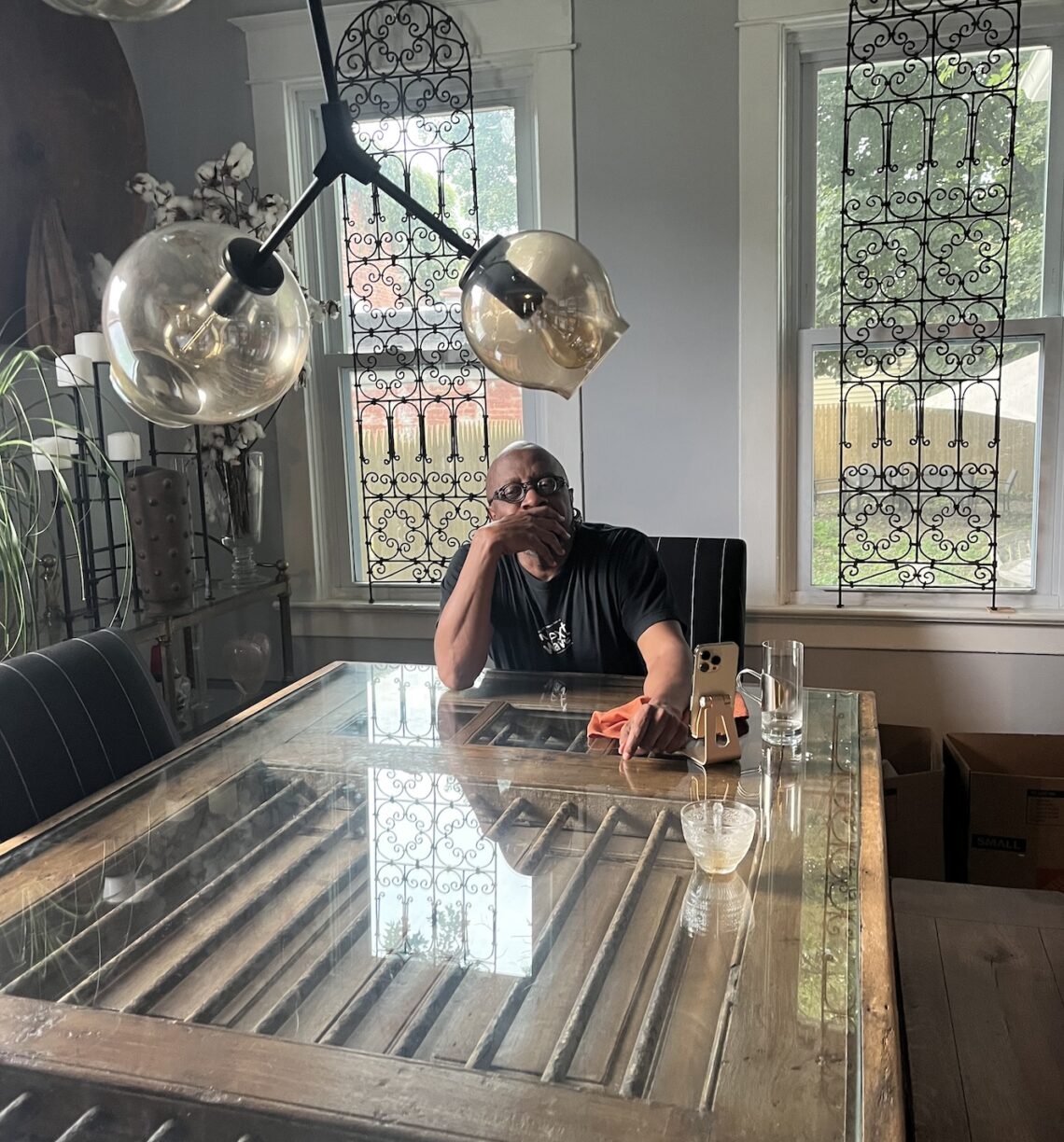
The Power of Beauty and the Art of Conversation with Curator Archie Broady
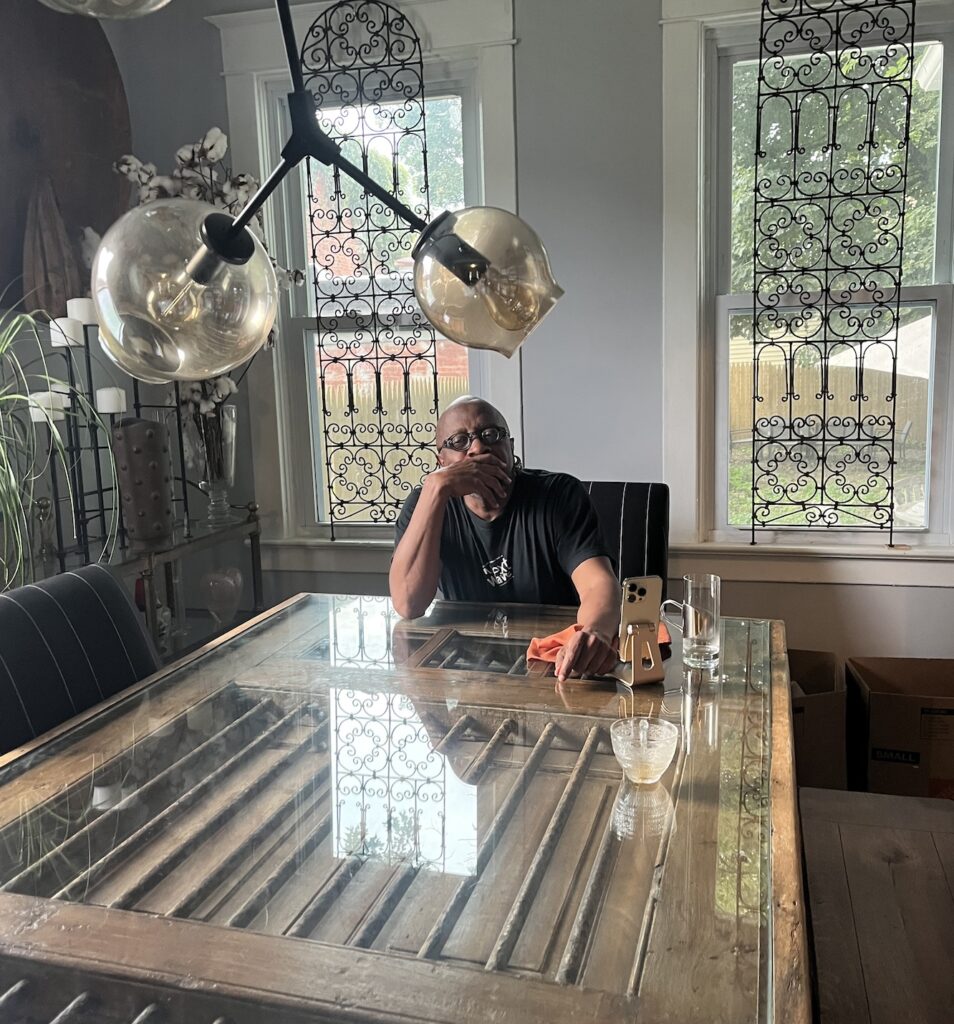
I step over the threshold of Archie Broady’s house and I am in a different world. It’s an art gallery, a library, an artist salon… in fact, it is the inside of Archie’s mind.
He presides over his small living room that feels more like a hall in a castle. The right wall is lined with books: everything from Pushkin to Shakespeare. An eclectic but tasteful selection of art objects occupies the rest of the walls and every corner. The table that dominates the room is a masterpiece: it is a salvaged window of a burnt-out church in Bali encased in glass.
Archie dives straight into the conversation as I sip instant coffee from a gorgeous crystal cup. It seems, he cares about the beauty of the cup much more than about the taste of the drink. I visit the rest of the house: the staircase has stacks of books on every step, and Archie’s bedroom is studded with books as well.
“There is a story somewhere here,” I think to myself, and ask him for an interview. He agrees and warns me: “It’s not going to be deep, just confusing. Also, don’t believe anything I say.”
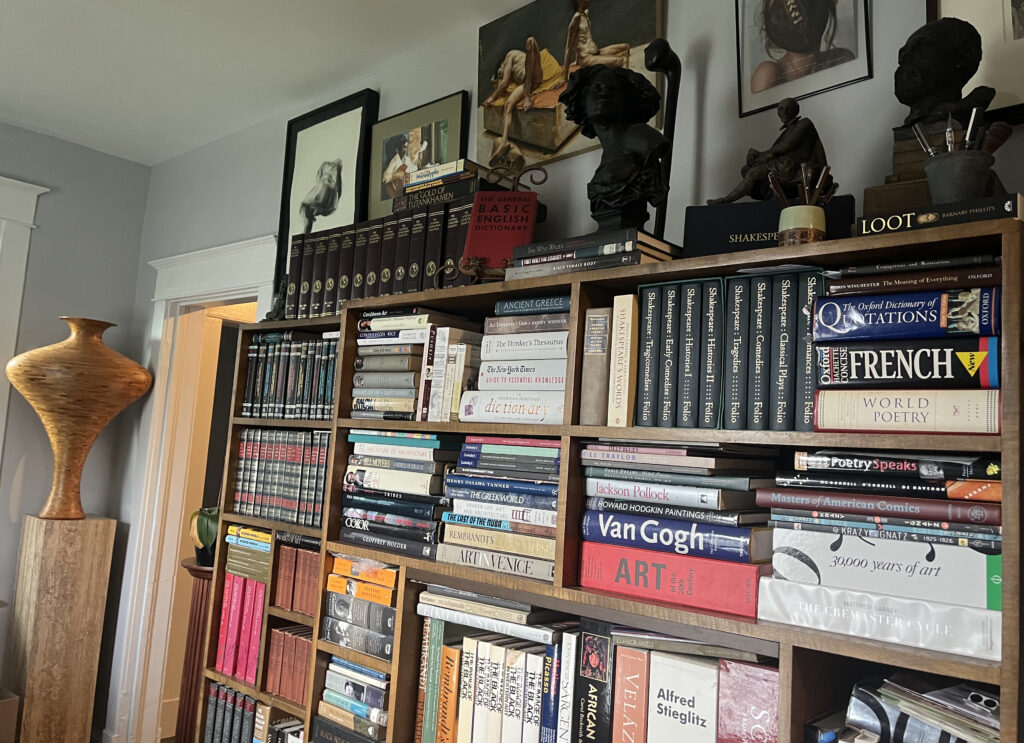
A few weeks later we sit down for a conversation. I cozy up, ready for a long one. Chats with Archie are like jazz pieces: they travel far and wide and there are lots of unexpected turns.
He shares he was born in Brownsville, NY. “If you Google it,” he tells me, “it says stay the f*** away. Mike Tyson is from there. And even when he got famous, he was scared to go back.”
Archie grew up very poor, his mother carrying the load of nine kids all by herself.
“I was in third grade,” he said. “And one day, when I got to school, I was so cold because I had holes in my shoes. So, I stuck them under the radiator and the shoes shrunk. It was the most painful walk home because my shoes were too small. But I never blamed my mother. Not even when there was no food. I knew she tried her best.”
He makes this point several times. I can hardly imagine what it’s like to see the only adult you can rely on failing, and it’s not even their fault.
“I would steal,” he continues. “I was a second-story thief, climbing roofs and throwing bottles at my opponents with ridiculous accuracy. The first time I got arrested I was five years old. We had broken into a toy factory at night and the cops got us.”
There is an old-fashioned sign in Archie’s kitchen that reads “Two hamburgers for 25 cents.” He used to steal change from his mother’s pocketbook so he could buy his friends some food, because when he was lucky enough to get a burger, they would watch him eat, enduring their hunger in silence. Years later, he found the sign at a salvage yard in Soho.
“I bought the sign and cried,” he confesses.
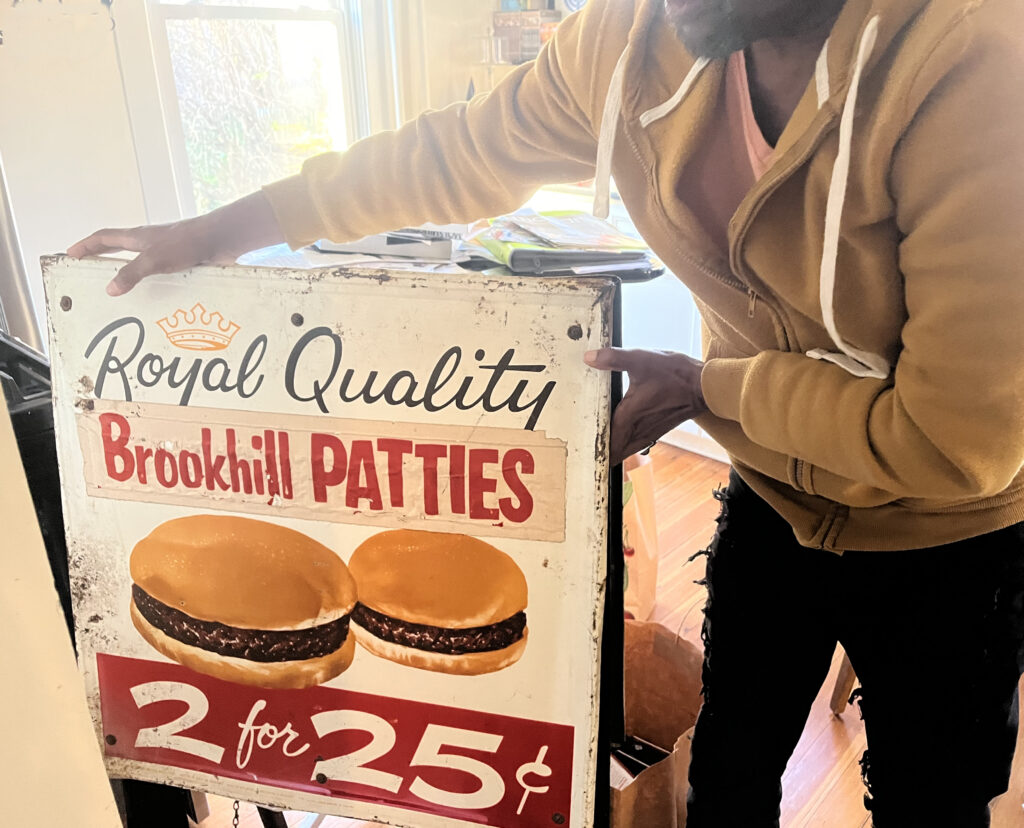
He tells me he had two older brothers and six sisters and they were all fighters but he wasn’t, he was a “punk,” as he puts it. In his adolescence, the street reality came at him in full force, with some friends getting arrested and others killed.
“I remember sitting on the stoop of my mother’s house with my eyes closed,” Archie reminisces. “I was thinking if aliens ever came down they would never know who I was.”
That’s when he realized how small his world was and how much he wanted to go beyond it. He started looking at newspapers and listening to talk shows and realized he understood very little either. So, when he learned that James Baldwin read every book in the library, he thought “If he could do it, I can do it, too.”
Archie would go to his local library and steal the books. He didn’t check them out because the process of signing up for the library was something from a foreign universe: daunting and too complicated. Stealing was just a go-to at the time. Some years later when his ways began to change, he brought the books back and confessed he had stolen them.
“It took me three days to bring them all back,” Archie tells me. “I read everything: astrology, numerology, a book on poker, manicure… I wanted to be like those white people who talked of things, I assumed they knew everything. But when I started meeting them, I realized they didn’t know anything. It was just name-dropping.”
In his quest to impress the aliens, he stopped talking to his street friends to carve out more time for learning.
“People would say what’s up and I’d walk past them. I was ghosting them in person. It was love. I didn’t know how to get rid of them.” And eventually, they stopped speaking to him, so Archie had more time to read and figure out “what it all meant.”
He took himself to the opera, to the ballet.
“I’ve never seen anything like that before, even the sidewalk, the stairs, the building, it was from the movies to me,” Archie said his first impressions of the Metropolitan Museum was “the beauty of exposure.”
This last statement gives me pause. I remember visiting the Columbia University campus, and how its immensity and symmetry made a deep impression on me. At the time, I wondered how different it must have been to study in this environment as opposed to the dimly lit halls of a community college. It wasn’t just about the prestige of one school versus the other. It was precisely about what Archie said: the power of exposure. The outlook on life, the possibilities one sees, the trust in the world one develops when surrounded by beauty and knowledge – all of it gives one a headstart in life some others would never dream of.
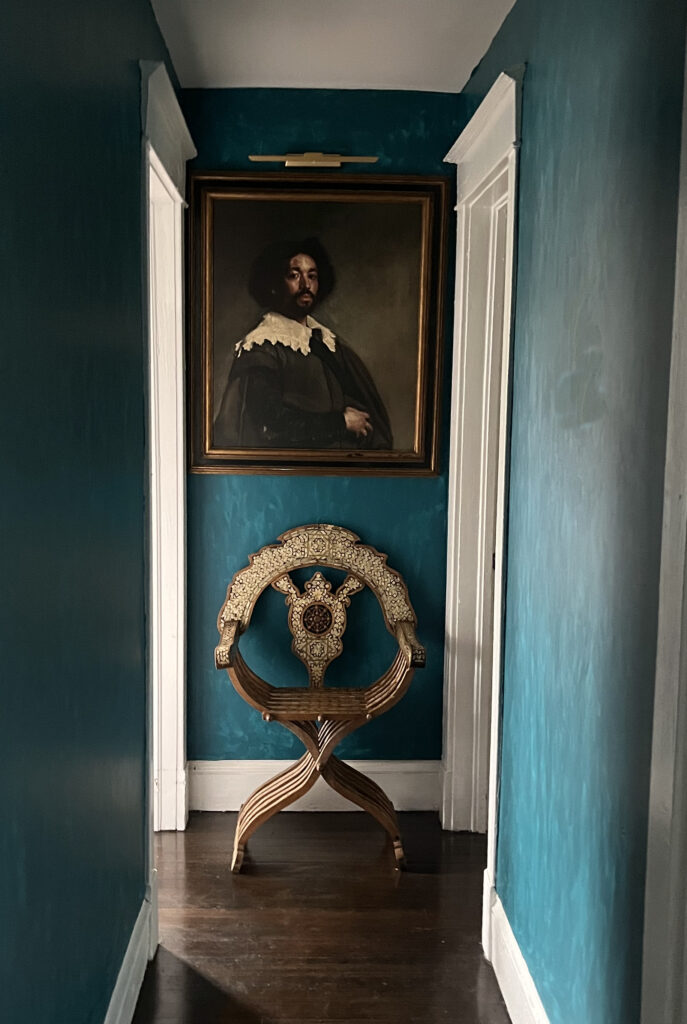
Luckily, New York City had glimpses of another world scattered generously throughout. One day, taking the subway, Archie saw a painting by Diego Velasquez on an advertising poster… it was the famous painting of his servant. He explains that the artist was practicing on his servant before painting the king and then that painting became the masterpiece.
“It moved me. In the right lighting, you see that the person is there. It’s not about technique but he got his essence,” Archie says as his eyes travel to the space above me where the reproduction of the painting is hung.
Through the exposure to art, he discovered a whole other side of himself.
“My talent is taste,” he says. His senses are finely tuned to all things beautiful. He is the kind of man who walks into a gallery and tells the gallerist to flip the most expensive piece in the space. The gallerist protests, arguing that the artist himself had it hung this way. And yet, once the painting is flipped as Archie suggested, it sells within an hour.
“In the street, they called me Ronnie,” he continues down the memory lane. “Now I’m out working for white people and they call me Archie.” But one world was not enough, he could handle two, so he decided to start talking to his street friends again. “And they acted like nothing happened which makes me cry now,” Archie admits.
“I started having dinner parties. So, my friends from different parts of my life would come. My street friend would walk in and I’d say to my white friend, ‘Put your pocketbook away.’” The white friend, perplexed, would ask why this menace was even there. “And I’d switch back to ‘street’ and now I’m mad because why can’t this person come to my party? Let’s get this straight: that motherfucker would give his life for me,” Archie says, his anger new again. “I love you, too, so I tell you to hide your wallet.”
The eclectic yet sophisticated dinner parties were a solace from the daily grind in one of the most expensive cities in the world. Archie has done many odd jobs over the years. Some of them happened in the midst of the New York’s turbulent 80s and 90s, and stories could be written about his path through the treacherous city. Eventually, however, he grew his own cleaning business, mainly taking care of theaters. “The cleaning business allowed me to buy art. I opened my own boutique and gallery,” Archie said.
As the conversation progresses amidst the biographical facts, he inserts fascinating pieces of information about music, his admiration for the Met Museum director, stories of him going to Nina Simone concert and cursing her out for bad behavior, criticizing the work of the first American Black artist on a world tour in front of an auditorium full of people. The conversation is, indeed, a jazz piece, surprising and inspiring.
I ask about Newburgh, where his current house is, with an expectation of a discussion about the renaissance of the Black art community around the city that used to rank the most dangerous in the state. But there are no expectations when it comes to Archie, no “niceties.” He doesn’t like Newburgh, the scattered artist community is not up to Archie’s standards. New York is his true love. “Ninety percent of New York is trash and mediocrity,” he says, “but the remaining 10 is why we all come here. It is like nowhere else in the world.” And that’s that. “I’m an uppity ‘n-word’,” he shrugs his shoulders and smiles.
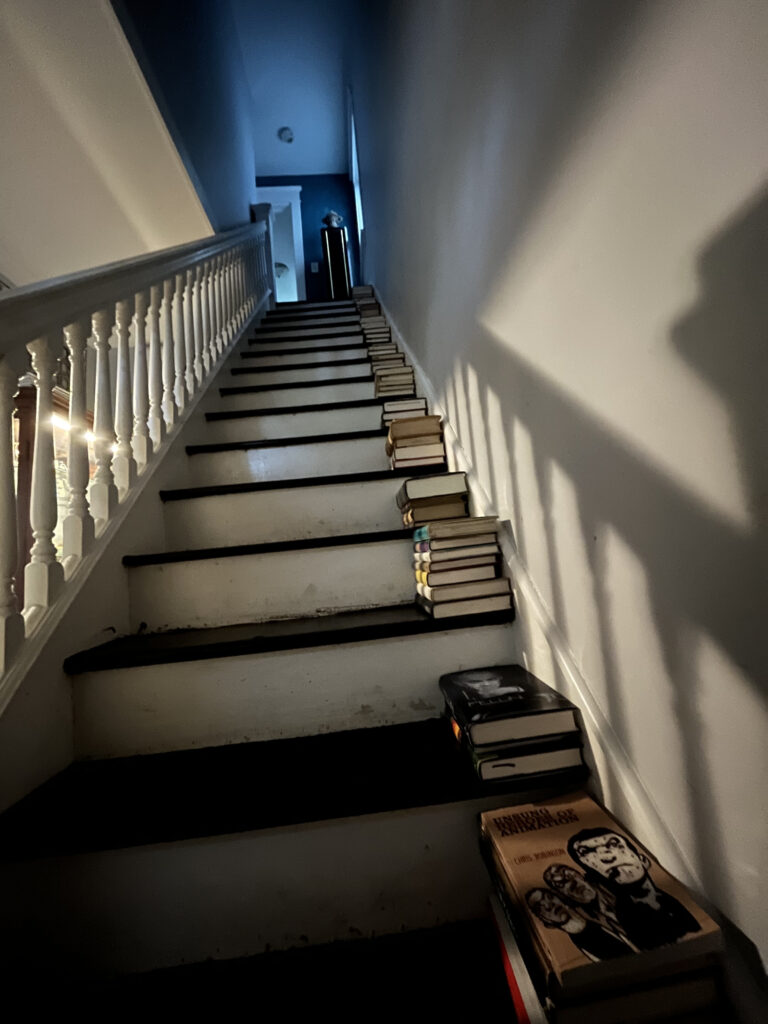
“No, I won’t write this down,” I think to myself. In the end, however, I realize that to paint an honest portrait of Archie Broady, I would have to put this down as well.
“Everybody goes to formalities. I like to skip the niceties,” he says. “I embrace my early life. I get the bougie part but I’ll never deny the other part. We shouldn’t ban words. I’ll say this word as many times as I want. Sometimes it’s just that word that fits, that’s why it’s there.”
When I ask whether the aliens would have been impressed by him were they to come down now, Archie only scoffs and says that he was full of himself when he wondered about that some 40 years back. I understand it has never been about impressing anyone for Archie, never about any kind of result, only about an insatiable thirst for knowledge, a bottomless curiosity. Sitting there, surrounded by hundreds of books, he tells me he never forgets how little he knows.
As our chat wounds down, I start to panic: our conversation has been fascinating but I feel like I barely scratched the surface. What was I going to write? What would be my conclusion? And then I realize: maybe, a conclusion is just another nicety. This is it. The conversation we are having, what I learn from it – that is what Archie does, what he is about.
“I was a slow reader, so I learned to read between the lines,” he says. He also tells me of a long conversation he had with a French lady even though he didn’t speak a word of French. “That’s when you go deep, not wide,” Archie says with a wide smile.
So, my panic subsides, I breathe in and smile, too. My mind slows down in its relentless effort to get to the result, and I let go and simply enjoy learning new things and the way the crystal cup feels in my hands. The instant coffee is cold by now but I couldn’t care less. To meet Archie is a lesson in life itself, an unforgetful one.




